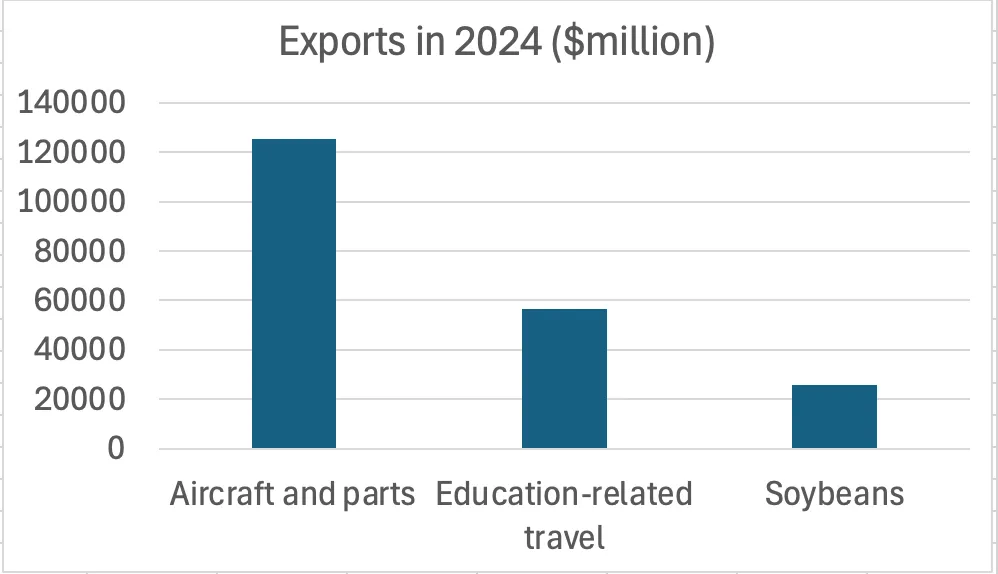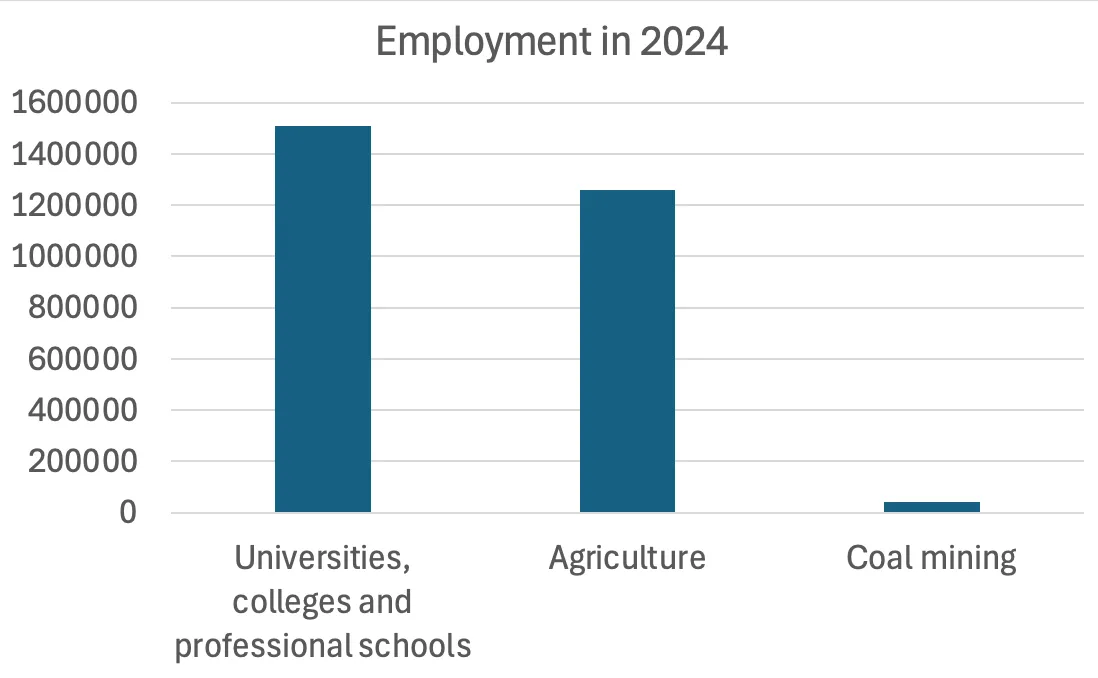- Paul Krugman on the economic damage of America’s withdrawal from the world;
- You can get away with anything if you donate enough to Trump;
- TACO: Trump Always Chickens Out;
- Zack Beauchamp on how the right isn’t driven by materialism, but by their culture;
- And how billion-dollar Sports Stadiums seem to be the best American can do.
Another round.

Paul Krugman, 28 My 2025: America Turns Its Back on the World subtitled “Blocking foreign students is an act of self-destruction — and self-betrayal”
Beginning with an anecdote:
My wife and I are co-authors of a widely used textbook on the principles of economics, which is revised on a three-year cycle. When a new edition comes out, I normally visit a number of schools that might adopt it, usually giving a big public talk, a smaller technical seminar, and spending some time with students and faculty. I enjoy it, by the way; there are a lot of good, interesting people in U.S. education, and not just in the high-prestige schools.
So it was that at one point I found myself visiting Texas Tech in Lubbock. Yes, it seemed pretty remote to someone who has spent almost his whole life in the Northeast Corridor, but as usual the overall experience was very positive. And it was also surprisingly cosmopolitan: there were students from many nations. I just checked the numbers, and currently 30 percent of Texas Tech’s graduate students are international.
So it is all across America. Our nation’s ability to attract foreigners to study here is one of our great strengths. Or maybe I should say was one of our strengths.
And then concerning Trump’s directive to prevent Harvard from admitting foreign students.
It’s hard to overstate the self-destructiveness of this move, and the war on higher education in general. This is madness even in purely economic terms.
We don’t often think of education as a major U.S. export, but it is. International students typically pay full tuition and require little or no financial aid. Here’s “education-related travel,” basically international students, compared with some other major U.S. exports:
(see chart above)
There’s more…

[I]nternational students often get something important from the experience of studying in America that goes beyond what they learn in classrooms and labs. They learn what it means to live in an open society, and bring that knowledge home. We talk about “soft power,” which is very real. But this actually goes beyond that. Educating students from abroad helps to disseminate fundamental American values around the world.
Of course, the people now running things do not themselves accept what people like me consider fundamental American values. They may insist that they’re pro-American, but what they mean by “America” is a land of bigotry where your identity is determined by blood and soil, a land of closed borders and closed minds.
To trim David Brin’s comment in yesterday’s post: “Maga hates all fact professions as smartypants know-it-alls.” So many of them, including Trump, are perfect Dunning-Krugers: they are so dumb, they don’t know how dumb they are.
\\\
Or perhaps Trump and his fans work on a different plane. Front page of today’s NYT:

NY Times, Kenneth P. Vogel, 27 May 2025: Trump Pardoned Tax Cheat After Mother Attended $1 Million Dinner, subtitled “Paul Walczak’s pardon application cited his mother’s support for the president, including raising millions of dollars and a connection to a plot to publicize a Biden family diary.”
Trump doesn’t believe in America as a liberal democracy (in the general meaning of “liberal”), or even as a business; he’s running it like a Mafia outfit. Pay enough tribute to the boss, and you get away with anything. Never mind law and order.
\\\
Trump has acquired a new nickname.

Politico, Ali Bianco, 28 May 2025: Trump’s not happy about Wall Street’s name for tariff flip-flops, subtitled “He bristles at the acronym TACO, which stands for ‘Trump always chickens out.’”
No one can be confidant about his threats, because he changes his mind twice a week.
\\\
What is the base motivation of the far right? Certainly not the “material,” since they vote against their own interests in material terms, as observers have noted for years.

Vox, Zack Beauchamp, 28 May 2025: Why the left gets the far right wrong, subtitled “The left’s attachment to thinking of politics in ‘material’ terms is causing it to misread the moment.”
Long analysis. For example,
In the United States, mainstream media and cultural figures were overwhelmingly hostile to Donald Trump all three times that he ran for president. They provided no end of information about how his policy proposals would harm the working class, and how his opponents’ ideas would benefit them. He won two out of three times anyway, with an increasing percentage of votes among lower-income and non-college voters.
And so on. The left continues to believe that “the roots of political behavior can ultimately trace back to material interests.”
Across the world, an egalitarian vision of democracy and social order has beaten its competitors — leading to the decline of formal hierarchies along racial, gender, ethnic, religious, and caste lines. This manifested in concrete social changes, like the entry of women into the workforce or the end of racially discriminatory immigration regimes, that profoundly unsettled certain traditionally-minded segments of the global population. Far-right parties became their champions.
This is a fundamentally postmaterial account of far-right politics. It argues that the right wins not by channeling people’s displaced economic anger, but by articulating ideas that match their deeply held beliefs, values, and identities.
Well yes, of course. It’s not just about making money in a capitalist society; it’s about the deeper (what I would call tribalistic) values.
They did not arrive at said beliefs because of their place in the class structure or assessment of self-interest, but rather because ideas and identity are social facts in their own right. When people go to church or talk to their parents about culture, they listen. And that defines who they are as human beings every bit as much as their role as economic producers, especially in a world where the average voter in a wealthy democracy is orders of magnitude more materially secure than the workers of Marx’s day.
So what should the left do, to appeal to these values voters?
Adopting a postmaterial analytic framework does not require abandoning left-wing politics. You can see voters as driven on ideas without abandoning normative commitments to improving the lot of workers, to bolstering the too-weak welfare state, or even to seeing the existence of billionaires as a crime against democracy and human decency.
In fact, I’d argue, doing so is essential for the left to succeed.
Well, OK. It’s also been long known that the wealthy Republican class are taking advantage of working class voters, by appealing to their religious priorities, while in the background passing legislation that benefits the wealthy. This has been happening for decades, and it’s happening again right now. Maybe the liberal platform should be to expose *this*. The writer concludes:
As long as the left insists on materialism as its most fundamental theory of politics, not just one possible account of human behavior but always the primary one, it will continue to misunderstand the sources of its far-right enemy’s power. It will continue proposing the same old slogans, regardless of their political efficacy, because to do otherwise would be to admit that materialism is in some important political sense no longer true.
So, can I boil this down? The right isn’t so much concerned with their own prosperity as they are preserving their values. And they don’t realize they’re being played by the Republicans, who reliably violate those values. (See above.) Because they’re not paying attention? Because…?
\\\
Trumpist Americans resent $100 million paid to Harvard eggheads, to fulfill government contracts, but they’re happy to spend billions on sports stadiums. Americans are no different than the Romans, with their bread and circuses.
NY Times, opinion by Binyamin Appelbaum, 28 May 2025: Sports Stadiums Are Monuments to the Poverty of Our Ambitions
People who say that the United States can’t build anything anymore must not be sports fans. Barely a year goes by without the debut of a sparkling new stadium or arena, often in the very cities where it’s most difficult to build almost anything else. A $2.3 billion baseball stadium in the Bronx. A 70,000-seat football stadium in the middle of Los Angeles County. A basketball arena on the San Francisco waterfront.
The latest example, announced last month by the mayor of Washington, D.C., is a $3.8 billion plan to build a stadium for the local football team, the Washington Commanders, on 180 acres of public land just two miles from the Capitol.
Washington is not an easy place to build housing, but no one should doubt the capital city’s capacity to build a stadium. The city opened a basketball arena in 1997, a baseball stadium in 2008 and a soccer stadium in 2018. In Washington, as in other American cities, homes for sports teams are the only kinds of homes that still get built.
The obvious reason is that sports are popular. Especially the N.F.L. When the Commanders win, Washington wakes up in a better mood. It doesn’t require a political science degree to understand why the city’s mayor, Muriel Bowser, is eager to persuade the team to return to Washington after a few decades in the Maryland suburbs. She wants to be popular, too.
Well, obviously, but why? Once again I invoke one of my recurrent themes: human nature evolved in an ancient, tribal environment, where warfare between rival tribes was routine — see OT. Over that long history, humans became primed for battle, for zero-sum games in which one side won and the other lost. In the modern environment, those battle impulses have become channeled into sports: mock warfare, where one side wins, and the other must lose. This is how Trump thinks about the world in general. But it’s not the way of the world, over millennia; humans have built a worldwide civilization by learning to cooperate with one another and promote non-zero-sum games. But the deep passions for battle among tribes lingers among most of us.
The article notes how little those stadiums are actually used. They sit empty most of the time. And what if society had such ambition to build better things? Concluding:
Academic studies have repeatedly concluded that public spending on stadiums is a bad investment. Indeed, one of the leading authorities on the subject has memorably described that conclusion as one of the rare subjects on which economists have approached unanimity.
Better investments would yield bigger returns. One can only imagine a world in which the mayors of American cities were equally motivated by the economic benefits of public transit. But it’s much less expensive, much easier and much more fun to build a gussied-up grandstand than to invest in faster commutes or high-quality public education. The $3.8 billion price for the Commanders stadium is a lot of money, but it is a small fraction of what it would cost to build a neighborhood on the same land.
Our stadiums are monuments to the poverty of our civic ambitions and our inability to summon the collective will to use the land we have for the things we need. They are distractions from our inability to build anything else.





